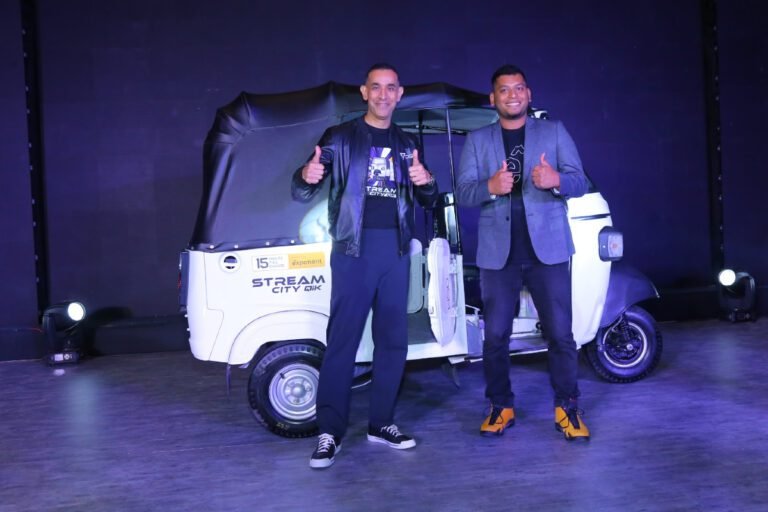India gets an electric three-wheeled passenger vehicle that charges from 0 to 100% in 15 minutes. The launch of the new EV — a collaboration between carmaker Omega Seiki Mobility and battery technology startup Exponent Energy — comes amid India’s ambition to electrifies 80% of all its three-wheelers by 2030 in an effort to reduce emissions.
The new three-wheeler, called the Stream City Qik and priced at $3,900 (INR 324,999), was launched on Friday and will go on sale from May 15 in Delhi and Bangalore. It is a variant of the previous Omega Stream City and features a proprietary 8.8 kWh battery to provide a range of 86 miles (126 km). It’s equipped with Exponent Energy’s charging technology, which the startup claims fully charges a battery in 15 minutes when plugged into the startup’s charging station (called the e^pump).
Exponent Energy currently has 60 charging stations across six cities: Delhi-NCR, Bengaluru, Chennai, Ahmedabad, Kolkata and Hyderabad. It plans to have 100 charging stations in Delhi-NCR and Bengaluru by 2024 and 1,000 stations in total by 2025, all of which will be available to Stream City Qik drivers, according to the company.
The partnership marks an expansion of Exponent Energy into new territory, as the Bengaluru-based startup previously offered its fast-charging technology for three-wheelers only in cargo and fleet operations. India’s three-wheeler passenger segment is more than 4 times the number of three-wheeler trucks, according to government data. The segment grew by more than 43%, with over 45,000 three-wheeled passenger vehicles sold in January alone.
Three-wheelers are popular with gig workers in India who use them to transport passengers and deliver parcels. The Indian government has given incentives to companies to encourage the manufacture of electric tricycles and has subsidized their sales to attract customers.
The partnership between Exponent Energy and Omega Seiki builds on the former’s previous partnerships. In 2022, Exponent partnered with Reliance Industries-backed Altigreen and India’s Murugappa Group owned by Montra Electric Group to launch cargo tricycles equipped with fast charging technology. The startup has also partnered with Morgan Stanley and BP Ventures-backed Magenta Mobility and Fyn Mobility to offer fast charging to their fleet. Over 1,000 vehicles, completing more than 100,000 charging sessions, currently feature Exponent Energy’s technology, which the startup aims to increase to 25,000 by 2025.
“We started with cargo to prove the technology,” Arun Vinayak, co-founder and CEO of Exponent Energy, told TechCrunch. “As we’ve scaled up, we’ve realized that individual drivers really love fast charging because those guys can’t charge their vehicles at home. And they’re much hungrier to put in more miles… they have to keep running, keep going where there’s demand and go where the passenger needs to be.”
Exponent Energy and Omega Seiki Mobility ran close tester pilots over the past two months to test consumer behavior. They found three-wheelers carrying up to three passengers sometimes run up to 22 hours a day, with two drivers using them back-to-back to milk inner-city demand. This makes it vital for passenger tricycles to have access to fast charging. The other alternative to fast charging in this case could be battery swapping, but that doesn’t work at scale, according to Vinayak.
“If you don’t charge a swap battery quickly, you’ll run out of batteries. And because these are replaceable batteries, you have a limited battery size and you have a pretty limited range,” he said.
The technology behind the tricycle upgrade
Exponent Energy’s battery technology includes lithium-ion batteries along with its internal battery management system, which monitors each cell in real-time while charging. In addition, the launch has its own charging stations that use an off-board thermal management system, which transfers ice water through the charging plug. This helps maintain the temperature of each battery cell during charging and enables 0-100% charging in 15 minutes along with a 3,000 cycle lifetime warranty.
Vinayak told TechCrunch that Exponent Energy’s charging stations offer 10x efficiency by charging 20 to 30 vehicles daily, while other EV charging stations typically charge two vehicles. Likewise, an Exponent charging station costs almost $6,000 (INR 500,000) to install, while a CNG station requires hundreds and thousands of dollars. This has limited CNG availability to about 60 stations in Bengaluru, while Exponent Energy already has 40 charging stations in the city, the executive said.
Image Credits: Omega Seiki Mobility
“If you give people very fast refueling capability, very fast recharging capability, a reliable and dense enough network, people actually stop caring about range,” he said.
Stream City Qik will initially be available in Delhi and Bengaluru, with plans to enter new cities later this year. Omega Seiki Mobility is also optimistic about bringing the fast-charging three-wheeler to markets beyond India once it gains enough traction.
“I can open markets all over the world. We have trials all over Southeast Asia, Bangladesh, Africa,” Uday Narang, founder and president of Omega Seiki Mobility, told TechCrunch.
New Delhi-based Omega Seiki Mobility has an annual production capacity of 20,000 vehicles, with three plants in North India and one in the eastern state of Jharkhand. Exponent Energy, on the other hand, has a monthly manufacturing capacity of 500 charging units, which it plans to increase to 3,000 by July-August.
At $3,900 (INR 324,999), the Stream City Qik is priced competitively with other electric and petrol powered tricycles in the Indian market. Vinayak and Narang said they are not looking to beat the competition on pricing, but want to help eliminate charging anxiety among three-wheeler drivers and increase their monthly income by up to 30%.
Founded in 2020, Exponent Energy, which counts Eight Roads Ventures, Lightspeed Venture Partners and TDK Ventures among its lead investors, has raised $44.4 million to date. The startup generated annual recurring revenue of $6 million in 2023 and aims to reach around $72 million by 2025. It is also looking to roll out its charging technology on electric buses in India later this year.
